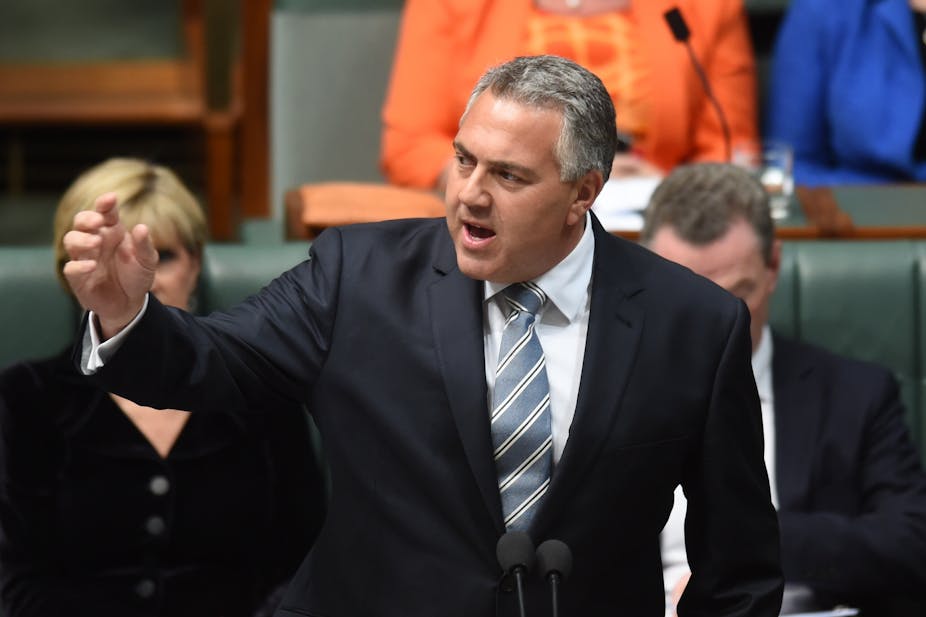Treasurer Joe Hockey is struggling to sell his co-payment policy to the Senate and the Australian public – and it’s easy to see why.
Charging patients $7 for GP, pathology and diagnostic services that are currently bulk billed would not only reduce access to care for the most vulnerable patients, it’s likely to increase costs elsewhere in the health system and lead to poorer patient outcomes.
As I argue in the latest issue of the Australian New Zealand Journal of Public Health, while mandatory co-payments lead to under-servicing of those who can’t afford to pay, they also provide GPs with incentives to over-service those who can.
Under-servicing
Co-payments create a barrier to primary care for those in greatest need and those most reticent to visit their GP. This includes people avoiding vaccinations and treatment for infectious diseases, and those with lifestyle-related risks such as smoking, excess weight and alcohol problems.
These groups are the most cost-effective populations to treat in primary care settings. Reducing their access to primary care and early interventions will cause many to present later to hospitals and other more expensive health-care settings as more complex cases, with higher treatment costs and worse health outcomes.
While bulk billed GP visits currently cost the health system $36.30, the average hospital inpatient admission costs more than 100 times more, in the order of $5,000. Shifting health problems from primary care to hospitals also moves the cost burden from the Commonwealth to the states.
Over-servicing
In response to reduced use of GP services by these populations, GPs can be expected to discretionarily over-service those who can afford to pay to fill schedules and income targets. As seen in fee-paying sectors of the United States health system, over-servicing typically manifests in over-prescribing medication and ordering unnecessary tests for unexpected or rare diseases or conditions.
Such tests are not perfect, with the chance of testing positive in patients who don’t have the disease often around 20%. Where the risk of a disease is small, use of such tests will lead to rates of false positives many times that of true positives and downstream costly and unnecessary treatment, often with health risks.
Over-servicing may also occur after conditions are correctly detected and aggressively managed. Take early stage prostate cancer, for instance. GPs may initiate invasive treatment where it is questionable or potentially detrimental, causing unnecessary health risks, anxiety and reduced quality of life.
Impacts of cost shifting to states
The budget proposes allowing state governments to charge $7 fees for primary care-type patients who present to hospital emergency departments, in an attempt to prevent patients who should be treated in primary care setting presenting to hospital.
However, given not treating these patients in primary care is expected to lead to their later presentation as acute cases, it should be no surprise that state governments have not welcomed the proposal for emergency department co-payments.
Such a policy would also undermine universal and equitable access to emergency department care and place additional administrative costs, stresses and burden on hospital staff charged with assessing those required to pay, and denying access to those who are unable to.
Never the less, treating primary care patients in emergency departments is generally more costly and takes considerably longer than in a GP setting. Any increase in primary care patients presenting to emergency departments to avoid GP fees will increase queues and waiting time, as already stretched emergency department resources strain beyond bursting point to deal with increased patient flows.
These strains on emergency departments and downstream hospital impacts on states are further reinforced by other budget proposals to reduce hospital funding to states, scale back care co-ordination and prevention bodies and activities.
Universal care
The proposed $7 charges are supposed to do some of the “heavy lifting” of the budget. But with expected downstream impacts, it’s more likely to give the health system the equivalent of a hernia. The budget’s health policy proposals are ideologically driven and have been rightly criticised for further entrenching disadvantage.
It’s time for Treasurer Hockey to accept what Australians want – and don’t want – from their health system. Australians don’t want to trade Medicare and universal access for an American-style private-paying health system. And for good reason: it is the least accessible and highest-cost system in the world and delivers some of the worst health outcomes both from under- and over-servicing.
The introduction of mandatory GP fees, and over-servicing patients those who can afford care and under-servicing those who can’t, moves us dangerously towards a US-style health care system.

